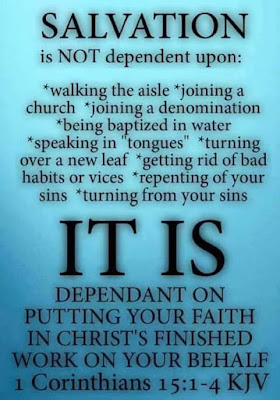Mark 1:15, “And saying, The time is fulfilled, and the kingdom of God is at hand: repent ye, and believe the gospel.” Acts 20:21, “Testifying both to the Jews, and also to the Greeks, repentance toward God, and faith toward our Lord Jesus Christ.”
The interpretation of ‘repent and believe’ that has been most common, is the belief that to repent is one thing, and to believe is another. Traditionally, to repent is to turn your back on sin, and turn to face God and walk in His ways. To believe is to put your faith in Jesus Christ. It is true, of course, that traditional teaching has not isolated these two things from one another. Repentance and faith are taught as going ‘hand in hand’, but it is still clear that they are describing separate events.
Robert Farrar Capon suggests that repent and believe should be interpreted as one and the same thing. He writes, “I wouldn’t read ‘repent and believe’ … as if it meant ‘repent first, and then when you have got that job done right, believe’. I would read it as a double imperative doing duty for a conditional statement of a single truth: sort of like ‘spare the rod and spoil the child’, which really means ‘if you spare the rod, you will inexorably spare the child’.”
When read in this way, ‘repent and believe’ refers to a single act; the act of going from unbelief to faith. Repentance is a part of the believing process, it is not some separate act that earns Heavenly brownie points with a Divine book-keeper. To repent is turn your mind around. But what is it that we turn our minds around from? If Capon is correct, then it is unbelief that we turn from. So ‘repent and believe’ is not ‘turn from sin and believe in Christ’ as it has been presented, but ‘turn to belief from unbelief’.
Nowhere in the Bible do we find the meaning of repentance that the church has enjoyed peddling; the meaning that suggests ‘get your act cleaned up and then start believing in Jesus’. David DePra questions repentance and belief and concludes, “If I have repented, I have changed. But what changes about me if I repent? Well, fundamentally, what changes is I no longer live in unbelief....I stop believing my sin comes between myself and God."
It is easy to fall into the trap of thinking that IF we repent, God THEN gives us His grace and forgiveness. But this is not the way it works. Let's think about this for a moment. Once I say, "IF I repent, THEN God gives His grace," I am making grace conditional. I am basing God's grace on something that I do. Repentance is nothing more than our return to God; a return that Christ has already accomplished on our behalf in the Incarnation. The infinitely Gracious God has already forgiven us, and this is what makes our repentance possible. (Michael Jinkins)
The point is this: God's forgiveness and grace are finished for me. They are finished for everyone -- no matter whether they have repented or not. That is because His finished work depends solely upon Him. There are no "IF's." Grace is NOT based on anything I do, or even based on whether I repent. They are based solely on what Christ has done. If it is based upon me, it must by definition, cease to be Grace. SOURCE
Robert Farrar Capon suggests that repent and believe should be interpreted as one and the same thing. He writes, “I wouldn’t read ‘repent and believe’ … as if it meant ‘repent first, and then when you have got that job done right, believe’. I would read it as a double imperative doing duty for a conditional statement of a single truth: sort of like ‘spare the rod and spoil the child’, which really means ‘if you spare the rod, you will inexorably spare the child’.”
When read in this way, ‘repent and believe’ refers to a single act; the act of going from unbelief to faith. Repentance is a part of the believing process, it is not some separate act that earns Heavenly brownie points with a Divine book-keeper. To repent is turn your mind around. But what is it that we turn our minds around from? If Capon is correct, then it is unbelief that we turn from. So ‘repent and believe’ is not ‘turn from sin and believe in Christ’ as it has been presented, but ‘turn to belief from unbelief’.
Nowhere in the Bible do we find the meaning of repentance that the church has enjoyed peddling; the meaning that suggests ‘get your act cleaned up and then start believing in Jesus’. David DePra questions repentance and belief and concludes, “If I have repented, I have changed. But what changes about me if I repent? Well, fundamentally, what changes is I no longer live in unbelief....I stop believing my sin comes between myself and God."
It is easy to fall into the trap of thinking that IF we repent, God THEN gives us His grace and forgiveness. But this is not the way it works. Let's think about this for a moment. Once I say, "IF I repent, THEN God gives His grace," I am making grace conditional. I am basing God's grace on something that I do. Repentance is nothing more than our return to God; a return that Christ has already accomplished on our behalf in the Incarnation. The infinitely Gracious God has already forgiven us, and this is what makes our repentance possible. (Michael Jinkins)
The point is this: God's forgiveness and grace are finished for me. They are finished for everyone -- no matter whether they have repented or not. That is because His finished work depends solely upon Him. There are no "IF's." Grace is NOT based on anything I do, or even based on whether I repent. They are based solely on what Christ has done. If it is based upon me, it must by definition, cease to be Grace. SOURCE








No comments:
Post a Comment
Note: Only a member of this blog may post a comment.